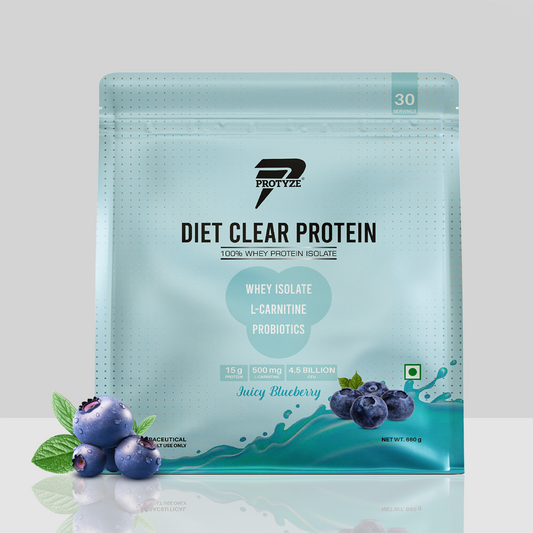Whey protein has gained massive popularity over the last two decades, becoming a staple in the fitness and wellness world. From professional athletes to casual gym-goers, millions of people incorporate whey protein into their daily routines to support muscle recovery, weight management, and overall health. But a recurring question still persists: Is whey protein safe for daily use?
This blog dives into the scientific evidence behind whey protein’s safety, daily usage, long-term health implications, potential side effects, and who should or shouldn't consume it. We’ll also cover its benefits and how to choose the right whey protein supplement for your goals.
What Is Whey Protein?
Whey protein is a high-quality protein derived from milk during the cheese-making process. It contains all nine essential amino acids, making it a complete protein. There are three primary types:
- Whey Protein Concentrate (WPC): Contains low levels of fat and carbohydrates. Protein content varies between 70-80%.
- Whey Protein Isolate (WPI): Highly filtered to remove fat and lactose. Contains over 90% protein.
- Whey Protein Hydrolysate (WPH): Pre-digested for faster absorption, often used in medical and sports nutrition.
Each type has its unique benefits, but they all share the core value of being a rich source of bioavailable protein.
Is It Safe to Take Whey Protein Every Day?
What Science Says
Numerous scientific studies confirm that daily consumption of whey protein is generally safe for healthy individuals when taken in recommended amounts. According to a review published in the Journal of the International Society of Sports Nutrition (JISSN), consuming up to 1.6 to 2.2 grams of protein per kilogram of body weight per day, including protein from supplements, poses no adverse effects for most people.
WHO and FDA Stance
- World Health Organization (WHO): Recommends a minimum daily protein intake of 0.8 g/kg for sedentary individuals, higher for active people.
- FDA: Recognizes whey protein as safe (GRAS - Generally Recognized As Safe).
The key is moderation and balance. Using whey protein to supplement your dietary protein intake—not replace whole foods—is the safest approach.
Benefits of Daily Whey Protein Intake
1. Supports Muscle Growth and Recovery
- Whey protein is rich in leucine, the amino acid most responsible for triggering muscle protein synthesis.
- Ideal post-workout supplement for faster recovery.
2. Aids in Weight Management
- Promotes satiety and reduces hunger.
- Preserves lean muscle mass during calorie deficit.
3. Boosts Immune Function
- Contains immunoglobulins and lactoferrin, which may enhance immune defense.
4. May Support Blood Sugar Regulation
- Whey protein helps slow gastric emptying, reducing post-meal blood glucose spikes.
5. Convenient Nutritional Support
- Easy to digest, quick to prepare, and ideal for people with busy lifestyles.
Who Can Benefit From Daily Whey Protein Use?
- Athletes and Bodybuilders
- Vegetarians (not vegans)
- Busy professionals
- Seniors needing muscle support
- People on weight loss diets
Potential Side Effects and Myths
Common Side Effects (usually mild and rare)
- Bloating
- Gas
- Cramping
- Nausea (often due to lactose intolerance)
To mitigate this:
- Choose whey protein isolate if you’re lactose intolerant.
- Start with a small serving and gradually increase.
Myths Debunked
- Myth: Whey protein damages kidneys
- Truth: In healthy individuals, high protein intake does not impair kidney function. People with existing kidney disease should consult a doctor.
- Myth: Whey protein leads to liver issues
- Truth: There’s no clinical evidence supporting this. Liver function remains stable with regular whey use in healthy people.
- Myth: Whey protein causes acne
- Truth: Limited evidence links dairy to acne in some individuals. If you’re acne-prone, observe your body's response.
How Much Whey Protein Is Safe Per Day?
The general recommendation:
- 0.8 - 1.2 grams of protein per pound of body weight (1.6 - 2.2g/kg) for active individuals.
- For a 70kg adult, that’s 112g - 154g of protein daily. Whey protein can be a part of this.
- 1-2 scoops (20g-40g) daily is typical and safe.
Overconsumption of any protein source can strain digestion and lead to unnecessary caloric intake.
When Is the Best Time to Take Whey Protein Daily?
- Post-workout: For muscle recovery and synthesis.
- Morning: To stop overnight muscle breakdown.
- Between meals: To curb hunger and stabilize blood sugar.
- Before bed: To support overnight muscle repair (especially casein protein, but whey also helps).
Choosing the Right Whey Protein
Look for these on the label:
- Third-party tested (for purity and heavy metals)
- No added sugars or fillers
- Low in lactose (if sensitive)
- High leucine content
Protyze Clear Whey Protein is an excellent example of a clean, fast-absorbing option for daily use—ideal for hydration and muscle recovery.
Daily Whey Protein Use and Special Conditions
1. Pregnancy and Breastfeeding
Generally safe but should be discussed with a healthcare provider.
2. Diabetes
Can help with blood sugar control, but monitor insulin response.
3. Kidney Disorders
Should limit high protein intake unless advised by a physician.
4. Teenagers and Adolescents
Safe when used moderately to supplement diet, not replace meals.
Whey Protein vs. Whole Food Protein
Whole food proteins (eggs, meat, lentils) provide additional nutrients like iron, zinc, fiber, and fats. Whey protein is more convenient and faster digesting. Use whey as a supplement, not a substitute.
Final Verdict: Is Whey Protein Safe for Daily Use?
Yes, whey protein is safe for daily use for the vast majority of people when taken in appropriate amounts. It is a highly researched, effective, and convenient supplement that can help you meet your protein needs, especially if you lead an active lifestyle.
Make sure to:
- Choose high-quality protein
- Stay within recommended daily intake
- Consult a doctor if you have pre-existing health conditions
Why Protyze Clear Whey Protein is a Safe Choice
Protyze offers a range of clear whey proteins formulated for fast absorption, delicious hydration, and easy digestion. With no added sugars, low lactose content, and clinically-backed ingredients, Protyze Clear Whey is designed to be your everyday partner in performance and wellness.
Hydrate. Recover. Perform—Every Day.
TL; DR
Yes, whey protein is safe for daily use when consumed in recommended amounts. Backed by scientific research and recognized as safe by health authorities like the WHO and FDA, whey protein supports muscle growth, recovery, weight management, immune function, and blood sugar control.
Common side effects like bloating or gas are rare and usually tied to lactose intolerance—easily avoided with whey isolate. Myths about kidney or liver damage have no basis in healthy individuals.
1–2 scoops (20–40g) per day is safe for most, especially when combined with whole food sources. It’s ideal for athletes, busy professionals, seniors, and those on weight loss plans.
Protyze Clear Whey Protein is a clean, fast-digesting, and hydrating option, making it a smart daily supplement choice.





